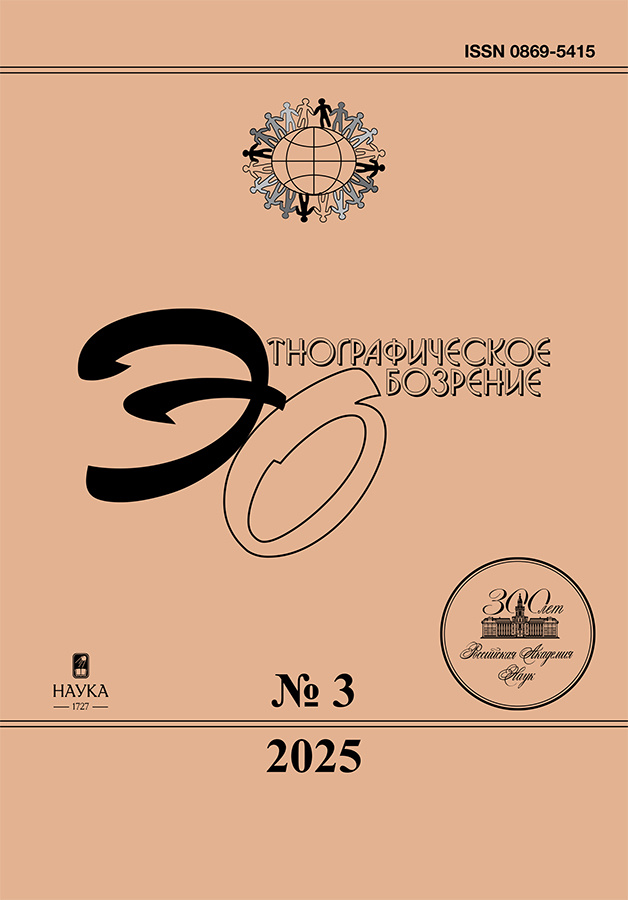Tribalism in Kenya: “our time to eat”
- Authors: Turinskaya K.M.1,2
-
Affiliations:
- Institute of Ethnology and Anthropology, Russian Academy of Sciences
- Institute for African Studies, Russian Academy of Sciences
- Issue: No 3 (2025)
- Pages: 206-220
- Section: Research Articles
- URL: https://consilium.orscience.ru/0869-5415/article/view/689607
- DOI: https://doi.org/10.31857/S0869541525030123
- EDN: https://elibrary.ru/MTWVGW
- ID: 689607
Cite item
Abstract
The article examines the ethnic history of Kenya during the years of colonialism and on the eve of the country’s independence. I argue that the Kenyan society may be considered as an essentially typical case in research on tribalism, national question, and federalism in Africa, as well as elsewhere in the world, and in the study of a country-specific version of “African socialism”. Having a short-lived experience of federalism on the eve of independence (the era of majimbo) and an experience of unitary state order during the independence period, Kenya in the 2010s turned back to decentralization and regionalism as a system of territorial and political structure. Some researchers believe that Kenya is returning to the practice of majimbo, i.e. devolution, and that a specific version of “ethnic federalism” is being established in the country when its administrative-territorial system is being adjusted to the tribal composition of the population. I attempt to demonstrate the relationship between the choice of regionalism and the prospects for political, economic, and cultural coexistence of different peoples within the confines of the country. Without analyzing the colonial experience, it is impossible to understand what is happening in modern Kenya, including the “ethnic policy” pursued by the Kenyan authorities.
Keywords
Full Text
About the authors
Khristina M. Turinskaya
Institute of Ethnology and Anthropology, Russian Academy of Sciences; Institute for African Studies, Russian Academy of Sciences
Author for correspondence.
Email: krikri75@yandex.ru
ORCID iD: 0000-0001-5536-6278
к.и.н., старший научный сотрудник, старший научный сотрудник
Russian Federation, 32-a Leninsky prospect, Moscow, 119991; 30/1 Spiridonovka St., Moscow, 123001References
- Ajulu, R. 2002. Politicised Ethnicity, Competitive Politics and Conflict in Kenya: A Historical Perspective. African Studies 61 (2): 251–268. https://doi.org/10.1080/0002018022000032947
- Balaton-Chrimes, S. 2021. Who are Kenya’s 42(+) Tribes? The Census and the Political Utility of Magical Uncertainty. Journal of Eastern African Studies 15 (1): 43–62. https://doi.org/10.1080/17531055.2020.1863642
- Branch, D. 2011. Kenya: Between Hope and Despair, 1963–2011. New Haven: Yale University Press.
- Burbidge, D. 2015. The Kenyan State’s Fear of Somali Identity. Accord. 23.10.2015. https://www.accord.org.za/conflict-trends/the-kenyan-states-fear-of-somali-identity
- Cheeseman, N., and M. Kamencu. 2024. The Battle for Central: Ethnicity, Urbanization and Citizenship in Kenya’s 2022 General Elections. Journal of Eastern African Studies 18 (2): 282–300. https://www.tandfonline.com/doi/full/10.1080/17531055.2024.2359155#d1e195
- Cheeseman, N., G. Lynch, and J. Willis. 2016. Decentralisation in Kenya: The Governance of Governors. Journal of Modern African Studies 54 (1): 1–35.
- Dagne, T. 2011. Kenya: Current Conditions and the Challenges Ahead. June 8, 2011. https://sgp.fas.org/crs/row/RL34378.pdf
- Dowden, R. 2009. Meat and Money: Eating in Kenya. In Africa: Altered States, Ordinary Miracles, by R. Dowden, 415–438. London: Portobello Books.
- Filatova, I.I. 1992. Liudi “Zelionykh holmov Afriki” mezhdu proshlym i nastoiaschim [The People of the “Green Hills of Africa” between the Past and the Present]. Moscow: Vostochnaia literatura.
- Klopp, J.M. 2002. Can Moral Ethnicity Trump Political Tribalism? The Struggle for Land and Nation in Kenya. African Studies 61 (2): 269–294. https://doi.org/10.1080/0002018022000032956
- Kurgat, A.J., L.S. Mulongo, and P.M. Kerre. 2015. Change or Continuity? Political Transitions and Democracy in Kenya. Aziia i Afrika segodnia 3: 35–40.
- Matveeva, N.F. 2010. Zemel’naia problema v Kenii [Land Problem in Kenya]. In Economicheskie i sotsial’no-politicheskie aspekty afrikanskoi bezopasnosti [Economic and Socio-Political Aspects of African Security], 18: 79–84. Moscow: Institut Afriki RAN.
- Nangulu-Ayuku, A. 2007. Reflections on the Postcolonial State in Kenya. In Reconstituting the State in Africa, edited by P.O. Agbese and G.K. Kieh, 127–179. New York: Palgrave Macmillan.
- Nyong’o, P.A, and C. Karugu. 2023. Tribe and Tribalism in Kenya’s Politics. CODESRIA Bulletin 1: 33–35.
- Ochieng, W.R. 1985. A History of Kenya. London: Macmillan.
- Ogot, B.A. 1974. Kenya Under the British, 1895 to 1963. In Zamani: A Survey of East African History, edited by B.A. Ogot, 249–294. Nairobi: EAPH Longman Kenya.
- Pegushev, A.M. 1972. Keniia. Ocherk politicheskoi istorii (1956–1969) [An Essay on Political History (1956–1969)]. Moscow: Vostochnaia literatura.
- Robertson, C. 2008. Beyond “Tribes”: Violence and Politics in Kenya. Origins: Current Events in Historical Perspective. April, 2008. https://origins.osu.edu/article/beyond-tribes-violence-and-politics-kenya
- Shilaho, W.K. 2023. Kenya’s Politicians Continue to Use Ethnicity to Divide and Rule – 60 Years after Independence. The Conversation. 19.07.2023. https://theconversation.com/kenyas-politicians-continue-to-use-ethnicity-to-divide-and-rule-60-years-after-independence-207930
- Soler Crespo, D. 2020. Support for Devolution in Kenya: A Multilateral Analysis. Pamplona: Navarra Center for International Development.
- wa Wamwere, K. 2003. Negative Ethnicity: From Bias to Genocide. New York: Seven Stories Press.
- wa Wamwere, K. 2008. Тowards Genocide in Kenya: The Curse of Negative Ethnicity. Nairobi: MwuleAfrica Publishers.
- Willis, J., and G. Gona. 2013. Pwani C Kenya? Memory, Documents and Secessionist Politics in Coastal Kenya. African Affairs 112 (446): 48–71. https://doi.org/10.1093/afraf/ads064
Supplementary files











